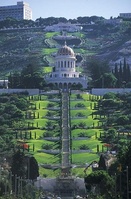Two more UNESCO World Heritage sites for Israel
 Earlier this month, the UNESCO World Heritage Committee added the Baha'i Shrines and Gardens in Haifa and Acre to the eleven World Heritage Sites in Israel. The resting places of the faith's founding fathers Baha'u'llah and the Bab, they represent the first World Heritage sites connected with a religious tradition born in modern times. The elaborate landscaped gardens and shrines are a site of annual pilgrimage, not only for the 5 million-strong Baha'i faithful, but also for hundreds of thousands of tourists from around the world.
Earlier this month, the UNESCO World Heritage Committee added the Baha'i Shrines and Gardens in Haifa and Acre to the eleven World Heritage Sites in Israel. The resting places of the faith's founding fathers Baha'u'llah and the Bab, they represent the first World Heritage sites connected with a religious tradition born in modern times. The elaborate landscaped gardens and shrines are a site of annual pilgrimage, not only for the 5 million-strong Baha'i faithful, but also for hundreds of thousands of tourists from around the world.The signature golden-domed shrine of the Bab in Haifa, surrounded by 18 immaculately-maintained terraces featuring symmetrical formal gardens that sweep down from Mount Carmel to the German Colony, is arguably the best-known landmark in Haifa, attracting over half a million visitors a year, as well as 8,000 Baha'i pilgrims. The shrine of Baha'u'llah, surrounded by landscaped gardens and located near the World Heritage site of the Old City of Acre, attracts 50,000 visitors a year. According to Douglas Moore, Director of the Bahai Public Information Office, the gardens, complete with fountains, waterfalls and ornaments, create a "peaceful, meditative atmosphere that uplifts the soul of pilgrims as they approach the shrines."
Despite the huge running costs of the sites, entrance to the gardens and shrine, which are open daily from 09:00 to 17:00, is free of charge (advance reservations for guided tours in English, Russian, French, German and Italian are necessary). The complex, including the gardens, shrine and other modern buildings in the neo-classical style that serve as administration centres, was built at a cost of $250 million, with the formal gardens completed in 2001. Annual maintenance of the gardens costs around $4 million, with over 100 full-time gardeners and 8 environmentally-friendly irrigation systems that conserve water. These costs are funded solely by members of the Baha'i religion as the faith, which promotes world peace and the creation of one worldwide community based on justice and equality, only accepts donations from within the Baha'i community.
Director-General of the Tourism Ministry Shaul Tzemach said: "International recognition of Israel's sites as World Heritage sites reflects the quality, universal importance and diversity of Israel's tourism product." The other 11 UNESCO World Heritage sites in Israel include Masada, the Old City of Jerusalem, the White City of Tel Aviv-Bauhaus, the Biblical Tels of Hazor, Megiddo and Beer Sheba, the Incense Route and the Nabatean desert cities of Mamshit, Avdat, Shivta and Haluza.
For more information about travel to Israel, log on to Thinkisrael.com.

